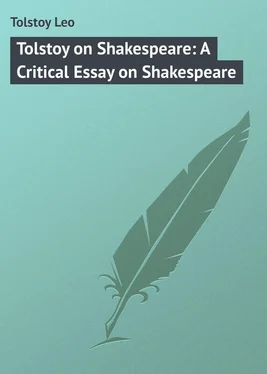Leo Tolstoy - Tolstoy on Shakespeare - A Critical Essay on Shakespeare
Здесь есть возможность читать онлайн «Leo Tolstoy - Tolstoy on Shakespeare - A Critical Essay on Shakespeare» — ознакомительный отрывок электронной книги совершенно бесплатно, а после прочтения отрывка купить полную версию. В некоторых случаях можно слушать аудио, скачать через торрент в формате fb2 и присутствует краткое содержание. Жанр: Русская классическая проза, foreign_language, на английском языке. Описание произведения, (предисловие) а так же отзывы посетителей доступны на портале библиотеки ЛибКат.
- Название:Tolstoy on Shakespeare: A Critical Essay on Shakespeare
- Автор:
- Жанр:
- Год:неизвестен
- ISBN:нет данных
- Рейтинг книги:5 / 5. Голосов: 1
-
Избранное:Добавить в избранное
- Отзывы:
-
Ваша оценка:
- 100
- 1
- 2
- 3
- 4
- 5
Tolstoy on Shakespeare: A Critical Essay on Shakespeare: краткое содержание, описание и аннотация
Предлагаем к чтению аннотацию, описание, краткое содержание или предисловие (зависит от того, что написал сам автор книги «Tolstoy on Shakespeare: A Critical Essay on Shakespeare»). Если вы не нашли необходимую информацию о книге — напишите в комментариях, мы постараемся отыскать её.
Tolstoy on Shakespeare: A Critical Essay on Shakespeare — читать онлайн ознакомительный отрывок
Ниже представлен текст книги, разбитый по страницам. Система сохранения места последней прочитанной страницы, позволяет с удобством читать онлайн бесплатно книгу «Tolstoy on Shakespeare: A Critical Essay on Shakespeare», без необходимости каждый раз заново искать на чём Вы остановились. Поставьте закладку, и сможете в любой момент перейти на страницу, на которой закончили чтение.
Интервал:
Закладка:
Leo Tolstoy
Tolstoy on Shakespeare: A Critical Essay on Shakespeare
PART I
TOLSTOY ON SHAKESPEARE
I
Mr. Crosby's article 1 1 This essay owes its origin to Leo Tolstoy's desire to contribute a preface to the article he here mentions by Ernest Crosby, which latter follows in this volume. – ( Trans. )
on Shakespeare's attitude toward the working classes suggested to me the idea of also expressing my own long-established opinion about the works of Shakespeare, in direct opposition, as it is, to that established in all the whole European world. Calling to mind all the struggle of doubt and self-deceit, – efforts to attune myself to Shakespeare – which I went through owing to my complete disagreement with this universal adulation, and, presuming that many have experienced and are experiencing the same, I think that it may not be unprofitable to express definitely and frankly this view of mine, opposed to that of the majority, and the more so as the conclusions to which I came, when examining the causes of my disagreement with the universally established opinion, are, it seems to me, not without interest and significance.
My disagreement with the established opinion about Shakespeare is not the result of an accidental frame of mind, nor of a light-minded attitude toward the matter, but is the outcome of many years' repeated and insistent endeavors to harmonize my own views of Shakespeare with those established amongst all civilized men of the Christian world.
I remember the astonishment I felt when I first read Shakespeare. I expected to receive a powerful esthetic pleasure, but having read, one after the other, works regarded as his best: "King Lear," "Romeo and Juliet," "Hamlet" and "Macbeth," not only did I feel no delight, but I felt an irresistible repulsion and tedium, and doubted as to whether I was senseless in feeling works regarded as the summit of perfection by the whole of the civilized world to be trivial and positively bad, or whether the significance which this civilized world attributes to the works of Shakespeare was itself senseless. My consternation was increased by the fact that I always keenly felt the beauties of poetry in every form; then why should artistic works recognized by the whole world as those of a genius, – the works of Shakespeare, – not only fail to please me, but be disagreeable to me? For a long time I could not believe in myself, and during fifty years, in order to test myself, I several times recommenced reading Shakespeare in every possible form, in Russian, in English, in German and in Schlegel's translation, as I was advised. Several times I read the dramas and the comedies and historical plays, and I invariably underwent the same feelings: repulsion, weariness, and bewilderment. At the present time, before writing this preface, being desirous once more to test myself, I have, as an old man of seventy-five, again read the whole of Shakespeare, including the historical plays, the "Henrys," "Troilus and Cressida," the "Tempest," "Cymbeline," and I have felt, with even greater force, the same feelings, – this time, however, not of bewilderment, but of firm, indubitable conviction that the unquestionable glory of a great genius which Shakespeare enjoys, and which compels writers of our time to imitate him and readers and spectators to discover in him non-existent merits, – thereby distorting their esthetic and ethical understanding, – is a great evil, as is every untruth.
Altho I know that the majority of people so firmly believe in the greatness of Shakespeare that in reading this judgment of mine they will not admit even the possibility of its justice, and will not give it the slightest attention, nevertheless I will endeavor, as well as I can, to show why I believe that Shakespeare can not be recognized either as a great genius, or even as an average author.
For illustration of my purpose I will take one of Shakespeare's most extolled dramas, "King Lear," in the enthusiastic praise of which, the majority of critics agree.
"The tragedy of Lear is deservedly celebrated among the dramas of Shakespeare," says Dr. Johnson. "There is perhaps no play which keeps the attention so strongly fixed, which so much agitates our passions, and interests our curiosity."
"We wish that we could pass this play over and say nothing about it," says Hazlitt, "all that we can say must fall far short of the subject, or even of what we ourselves conceive of it. To attempt to give a description of the play itself, or of its effects upon the mind, is mere impertinence; yet we must say something. It is, then, the best of Shakespeare's plays, for it is the one in which he was the most in earnest."
"If the originality of invention did not so much stamp almost every play of Shakespeare," says Hallam, "that to name one as the most original seems a disparagement to others, we might say that this great prerogative of genius, was exercised above all in 'Lear.' It diverges more from the model of regular tragedy than 'Macbeth,' or 'Othello,' and even more than 'Hamlet,' but the fable is better constructed than in the last of these and it displays full as much of the almost superhuman inspiration of the poet as the other two."
"'King Lear' may be recognized as the perfect model of the dramatic art of the whole world," says Shelley.
"I am not minded to say much of Shakespeare's Arthur," says Swinburne. "There are one or two figures in the world of his work of which there are no words that would be fit or good to say. Another of these is Cordelia. The place they have in our lives and thoughts is not one for talk. The niche set apart for them to inhabit in our secret hearts is not penetrable by the lights and noises of common day. There are chapels in the cathedrals of man's highest art, as in that of his inmost life, not made to be set open to the eyes and feet of the world. Love, and Death, and Memory, keep charge for us in silence of some beloved names. It is the crowning glory of genius, the final miracle and transcendent gift of poetry, that it can add to the number of these and engrave on the very heart of our remembrance fresh names and memories of its own creation."
"Lear is the occasion for Cordelia," says Victor Hugo. "Maternity of the daughter toward the father; profound subject; maternity venerable among all other maternities, so admirably rendered by the legend of that Roman girl, who, in the depths of a prison, nurses her old father. The young breast near the white beard! There is not a spectacle more holy. This filial breast is Cordelia. Once this figure dreamed of and found, Shakespeare created his drama… Shakespeare, carrying Cordelia in his thoughts, created that tragedy like a god who, having an aurora to put forward, makes a world expressly for it."
"In 'King Lear,' Shakespeare's vision sounded the abyss of horror to its very depths, and his spirit showed neither fear, nor giddiness, nor faintness, at the sight," says Brandes. "On the threshold of this work, a feeling of awe comes over one, as on the threshold of the Sistine Chapel, with its ceiling of frescoes by Michael Angelo, – only that the suffering here is far more intense, the wail wilder, and the harmonies of beauty more definitely shattered by the discords of despair."
Such are the judgments of the critics about this drama, and therefore I believe I am not wrong in selecting it as a type of Shakespeare's best.
As impartially as possible, I will endeavor to describe the contents of the drama, and then to show why it is not that acme of perfection it is represented to be by critics, but is something quite different.
II
The drama of "Lear" begins with a scene giving the conversation between two courtiers, Kent and Gloucester. Kent, pointing to a young man present, asks Gloucester whether that is not his son. Gloucester says that he has often blushed to acknowledge the young man as his son, but has now ceased doing so. Kent says he "can not conceive him." Then Gloucester in the presence of this son of his says: "The fellow's mother could, and grew round-wombed, and had a son for her cradle ere she had a husband for her bed." "I have another, a legitimate son," continues Gloucester, "but altho this one came into the world before he was sent for, his mother was fair and there was good sport at his making, and therefore I acknowledge this one also."
Читать дальшеИнтервал:
Закладка:
Похожие книги на «Tolstoy on Shakespeare: A Critical Essay on Shakespeare»
Представляем Вашему вниманию похожие книги на «Tolstoy on Shakespeare: A Critical Essay on Shakespeare» списком для выбора. Мы отобрали схожую по названию и смыслу литературу в надежде предоставить читателям больше вариантов отыскать новые, интересные, ещё непрочитанные произведения.
Обсуждение, отзывы о книге «Tolstoy on Shakespeare: A Critical Essay on Shakespeare» и просто собственные мнения читателей. Оставьте ваши комментарии, напишите, что Вы думаете о произведении, его смысле или главных героях. Укажите что конкретно понравилось, а что нет, и почему Вы так считаете.












